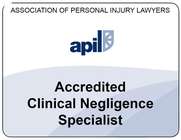medical negligence
Cerebral palsy: Medical negligence claims

Cerebral palsy is a neurological condition caused by brain damage, often resulting from complications before, during, or shortly after birth. It can affect movement, coordination, and overall development. While there is no cure, appropriate treatment and support can significantly improve a child’s quality of life.
Is there a cure for cerebral palsy?
There is no cure for cerebral palsy. However, individualized care plans, including therapies, medications, and assistive devices, can help manage symptoms and enhance mobility and motor function. Although cerebral palsy is not progressive, its symptoms may evolve over time.
In severe cases, cerebral palsy can be life-threatening and may reduce life expectancy, particularly when complications arise. People with severe symptoms often require round-the-clock care.
Types and symptoms of cerebral palsy
The NHS identifies four main types of cerebral palsy, each with distinct symptoms:
-
Spastic cerebral palsy: Stiff muscles and restricted mobility.
-
Dyskinetic cerebral palsy: Involuntary, uncontrolled movements.
-
Ataxic cerebral palsy: Poor balance, coordination issues, and tremors.
-
Mixed cerebral palsy: A combination of the above types.
Common symptoms include mobility issues, muscle stiffness, coordination difficulties, epilepsy, cognitive impairments, and speech difficulties. The severity varies significantly from person to person.
Causes of cerebral palsy
Cerebral palsy results from brain damage, which can occur:
-
During pregnancy: Due to infections, genetic abnormalities, or oxygen deprivation.
-
During labour and delivery: From oxygen deprivation (hypoxia or anoxia), birth trauma, or medical negligence.
-
Shortly after birth: Caused by brain infections, head injuries, or neonatal strokes.
While some cases are unavoidable, medical negligence can sometimes lead to cerebral palsy. Failing to monitor and respond to signs of distress during labour, misuse of delivery instruments, or delayed emergency procedures can contribute to preventable brain injuries.
Risk factors for cerebral palsy
Certain factors increase the risk of cerebral palsy, including:
-
Premature birth (before 37 weeks)
-
Low birth weight
-
Multiple births (twins, triplets, etc.)
-
Maternal infections or medical conditions
-
Blood type incompatibility
-
Placental issues
Healthcare providers should identify and manage these risks to minimize the chances of brain injury.
Diagnosing cerebral palsy
Doctors often diagnose cerebral palsy within the first two years of a child’s life, although mild cases may take longer to identify. Key developmental milestones, like head control, rolling over, crawling, and grasping objects, are closely monitored. If delays occur, further assessments, including brain imaging, may be recommended.
Making a medical negligence claim for cerebral palsy
If you believe your child’s cerebral palsy resulted from negligent medical care, you may be eligible for compensation. Our experienced birth injury solicitors can review medical records, consult independent experts, and determine whether negligence occurred.
Time limits for claims:
-
Claims can be made on behalf of a child until they turn 18.
-
After turning 18, individuals have three years to file a claim.
-
For those with severe cognitive impairments, these time limits may not apply.
We understand the emotional and financial impact cerebral palsy can have on families. Our compassionate team is here to guide you through the claims process and seek the compensation you deserve to support your child’s needs.
Contact us today for a free consultation and to discuss your potential cerebral palsy negligence claim.
Chat to the Author, Janine Collier
Executive Partner, Medical Negligence, Cambridge office
Meet Janine
- Areas of expertise
- Accreditations
- Testimonials
Legal 500 UK 2025
East Anglia
Janine Collier - one of the outstanding practitioners in the country. Not only excellent on all her own cases but ensures the standards of the whole team are extremely high.
Legal 500 UK 2025
East Anglia
Janine Collier is an excellent solicitor and runs a very dedicated and efficient team.
Legal 500 UK 2025
East Anglia
Janine Collier is exceptional for her detailed factual and legal analysis of claims, the high standard of her instructions, and her sensitive client management. Her energy is remarkable.
Legal 500 UK 2025
East Anglia
Janine Collier is an extremely able and committed lawyer; apart from her skill as a litigator and negotiator, Janine is known for going the extra mile for her clients. Janine's tenacity is evident from the excellent case outcomes she achieves; even in the most complex of cases, she is unafraid to litigate if the right settlement cannot be achieved, but her negotiating skills are such that she sees the benefits of settlement where the award is at an appropriate level as this provides certainty that does not follow litigation.
Legal 500 UK 2025
East Anglia
'Janine Collier inspired confidence and put us at ease. Janine always showed great empathy, and we felt we weren't treated simply as a case but as individuals. She was in regular contact by phone/email - even out of hours when required. She built a great team of experts for our case - and regularly questioned and challenged them. She also found us a good case manager, who found us experts who could really help us - and she negotiated an advance on our settlement to fund these.
Anonymous
Cambridge
Janine was extremely compassionate and caring about my experiences. Her words have remained dear to my heart and kept me strong throughout this process. She is a remarkable lady who truly wanted the best outcome for me. Anytime I contacted her, she always explained everything thoroughly and in detail. My queries were always resolved in her presence. She has a very good heart.
Legal 500 UK 2024
East Anglia
Janine Collier is a stand-out. She would be coveted by all top firms. An excellent leader, an excellent litigator.
Legal 500 UK 2024
East Anglia
Janine Collier has been brilliant throughout our whole process, and I have felt extremely supported and able to trust that she has my son’s best interests in mind with everything she does.
Legal 500 UK 2024
East Anglia
Janine Collier is hugely able and extremely hard-working – a perfect leader of the team as well as a fantastic litigator.
Legal 500 UK 2023
'Janine Collier has an amazing reputation and quite rightly, she very quickly spotted something that wasn’t the main focus of the case but is able to zoom out and look at everything that’s going on and spot things others wouldn’t spot. You can tell she really cares and is a very dedicated person who just wants to help. The team are all caring and efficient'
A
Cambridge
'A heartfelt thank you for all you have done in preparation for and during the settlement meeting, as well as for your unfailing support along the way, in and out of hours. It is undoubtedly due to your high professionalism if the outcome today has exceeded all expectations; it will be a huge help for us going forward and we will be forever grateful'
Chambers & Partners 2022
Cambridge
'Janine Collier is renowned for her handling of delay in diagnosis, obstetric injury and surgical negligence claims. She is at the top of her game and knows clinical negligence inside and out'
Susan Hickman
Cambridge
'We consider ourselves fortunate to have been recommended to Tees by the solicitor we initially approached. We did not realise it until the case was well established that the level of professional care we were receiving was exceptional and that the experience of the individuals and the contacts they have to assist in a very complex case was the best available. We are grateful that we received a satisfactory settlement as a result of their efforts under difficult circumstances and dealing with defendants that were obstructive and disorganised. By far the greatest benefit for us however is the fact that the victim, with assistance from highly skilled experts that we would not have known about otherwise, learned to walk short distances when all other medical opinion did not consider this possible. This was their greatest achievement which is well beyond the service we expected'
The Fisher family
Janine works with empathy, understanding and compassion. She handled our mother's inquest with skill and sensitivity and guided us expertly. She kept us informed continually via email and multiple meetings and phone calls. Janine completely took the sting and the stress out of our case.







